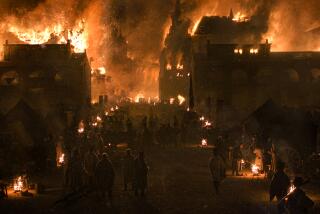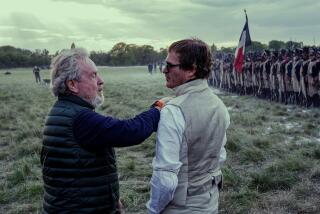TV REVIEW : ‘PATTON’ SEQUEL: THE FINAL BATTLE
- Share via
There’s something quite appropriate about the sequel to “Patton” being done for television, rather than following its predecessor into movie theaters.
The 1970 motion picture, which won Academy Awards as best picture and for the grand performance of George C. Scott, showed Gen. George S. Patton Jr. in his prime, fulfilling the destiny he proclaimed for himself as a warrior leading his troops to glory in World War II. It needed the big screen to depict the sweep of history and the enormity of his ego and personality.
“The Last Days of Patton,” airing Sunday from 8-11 p.m. on Channels 2 and 8, tells a much different story--smaller in scope, far more personal and, therefore, well suited to the small screen. Indeed, the general’s final battle, which occupies the last half of the movie, occurs within the confines of a hospital bed.
Scott, looking grayer and heavier than before, is otherwise in sync with his earlier performance, revealing a dynamic, intelligent, complex man whose public displays of pride and authority were tempered in private by brooding and remorse over his fate.
Little of the bold and audacious Patton from the first film is to be seen here. When we meet up with him in June, 1945, the war has been over for a month and he already is out of his element. “I’m an anachronism in peacetime,” he will later observe.
The TV movie overlaps with the previous film, which ended four months after the war with Patton’s removal as commander of the Third Army. The reasons for his removal had been quickly sketched in; now we see in more detail how, as military governor of Bavaria, he had disobeyed Gen. Dwight Eisenhower’s orders to go hard on the ex-Nazis and easy on the Russians.
Transferred to the 15th Army--a handful of clerks and officers whose duty, he sourly notes, is simply to “write a lot of stuff no one will ever read”--he makes plans to retire. But on Dec. 9, 1945, one day before he is scheduled to return to the United States, he is involved in an automobile accident that fractures his spinal column and leaves him paralyzed below the neck. Twelve days later, he dies.
It is this inglorious end for such a spirited man that provides “The Last Days of Patton” with great poignancy. As in the earlier film, regardless of whether you agree with Patton’s beliefs, you admire the sincerity with which he held them and the passion with which he acted upon them.
Added to this pathetic situation is a touching performance by Eva Marie Saint as Patton’s wife, Beatrice, who stays by his bedside throughout the ordeal, reading to him and reflecting on their lives and their 35-year marriage.
And ultimately, thanks to an eloquent script by William Luce and the sensitive direction by Delbert Mann, the film becomes not the epic story of a famous man dying but rather an intimate, sweet account of a couple trying under wrenching circumstances to make some accounting of their life together, and to say goodby.
Based on a book by Ladislas Farago and produced by William F. Storke and Alfred R. Kelman for executive producer Robert E. Fuisz, the film is heavily padded to fill out its time period; there are more doctors’ discussions of Patton’s condition than anyone could possibly care to see.
But Scott is such a forceful presence, and Saint’s scenes have such resonance, that interest is sustained and, finally, rewarded.
More to Read
The complete guide to home viewing
Get Screen Gab for everything about the TV shows and streaming movies everyone’s talking about.
You may occasionally receive promotional content from the Los Angeles Times.






